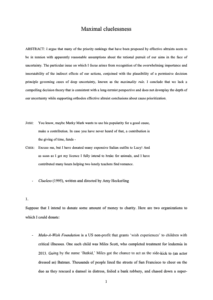Maximal cluelessness
Andreas Mogensen (Global Priorities Institute, Oxford University)
GPI Working Paper No. 2-2019, published in The Philosophical Quarterly
I argue that many of the priority rankings that have been proposed by effective altruists seem to be in tension with apparently reasonable assumptions about the rational pursuit of our aims in the face of uncertainty. The particular issue on which I focus arises from recognition of the overwhelming importance and inscrutability of the indirect effects of our actions, conjoined with the plausibility of a permissive decision principle governing cases of deep uncertainty, known as the maximality rule. I conclude that we lack a compelling decision theory that is consistent with a long-termist perspective and does not downplay the depth of our uncertainty while supporting orthodox effective altruist conclusions about cause prioritization.
Other working papers
The end of economic growth? Unintended consequences of a declining population – Charles I. Jones (Stanford University)
In many models, economic growth is driven by people discovering new ideas. These models typically assume either a constant or growing population. However, in high income countries today, fertility is already below its replacement rate: women are having fewer than two children on average. It is a distinct possibility — highlighted in the recent book, Empty Planet — that global population will decline rather than stabilize in the long run. …
The evidentialist’s wager – William MacAskill, Aron Vallinder (Global Priorities Institute, Oxford University) Caspar Österheld (Duke University), Carl Shulman (Future of Humanity Institute, Oxford University), Johannes Treutlein (TU Berlin)
Suppose that an altruistic and morally motivated agent who is uncertain between evidential decision theory (EDT) and causal decision theory (CDT) finds herself in a situation in which the two theories give conflicting verdicts. We argue that even if she has significantly higher credence in CDT, she should nevertheless act …
Once More, Without Feeling – Andreas Mogensen (Global Priorities Institute, University of Oxford)
I argue for a pluralist theory of moral standing, on which both welfare subjectivity and autonomy can confer moral status. I argue that autonomy doesn’t entail welfare subjectivity, but can ground moral standing in its absence. Although I highlight the existence of plausible views on which autonomy entails phenomenal consciousness, I primarily emphasize the need for philosophical debates about the relationship between phenomenal consciousness and moral standing to engage with neglected questions about the nature…

